

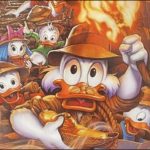
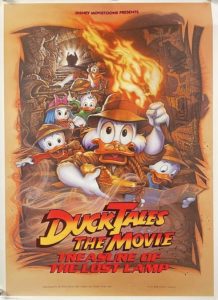 DuckTales. That two-word title (and the earworm theme song) brings about waves of nostalgia for an entire generation. In 1987, the series debuted as one of Disney’s first forays into television animation. The show was inspired by the stories crafted by Disney Legend, Carl Barks, the comic book artist and writer who created Duckburg and the adventures of Uncle Scrooge, and nephews Huey, Dewey, and Louie.
DuckTales. That two-word title (and the earworm theme song) brings about waves of nostalgia for an entire generation. In 1987, the series debuted as one of Disney’s first forays into television animation. The show was inspired by the stories crafted by Disney Legend, Carl Barks, the comic book artist and writer who created Duckburg and the adventures of Uncle Scrooge, and nephews Huey, Dewey, and Louie.
The series was so popular that it was expanded for the theatrical animated feature, DuckTales the Movie: Treasure of the Lost Lamp, which debuted thirty-five years ago this month.
The film centered on Scrooge, his nephews, their friend Webby, pilot Launchpad McQuack, and their search for the “Treasure of Collie Baba,” while assisted by their local guide, Dijon.
They return to Duckburg with a magic lamp, which the kids discover has a Genie inside it. As it turns out, Dijon is also working for the shapeshifting evil sorcerer Merlock, who is also trying to get his hands on the lamp.
DuckTales the Movie: The Legend of the Lost Lamp featured the voices of Alan Young as Uncle Scrooge (at this point, he had been providing the character’s voice since 1974 for the record album, Mickey’ Christmas Carol), as well as a number of well-known character actors, voice actors and comedians, including Christopher Lloyd as Merlock, Russi Taylor as the nephews and Webby, Terrence McGovern as Launchpad, Richard Libertini as Dijon, June Foray as Scrooge’s secretary, Mrs. Featherby, Chuck McGann as butler Duckworth, Joan Gerber as housekeeper Mrs. Beakley and Rip Taylor as the Genie.
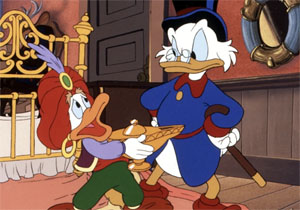 Directed by Bob Hathcock, DuckTales the Movie: Treasure of the Lost Lamp was the first feature from Disney MovieToons Studio in California, where character design and storyboards were completed, and then animation was done at Disney’s Studio in France. The film’s story began as several episodes of the DuckTales series, which were then merged together as a film.
Directed by Bob Hathcock, DuckTales the Movie: Treasure of the Lost Lamp was the first feature from Disney MovieToons Studio in California, where character design and storyboards were completed, and then animation was done at Disney’s Studio in France. The film’s story began as several episodes of the DuckTales series, which were then merged together as a film.
Disney MovieToons went through several transitions and name changes through the years (the Studio closed in 2018). It became the home for Disney’s many direct-to-video sequels.
Animation in DuckTales the Movie falls somewhere between the more limited television animation and the lush animation of the studio’s features. There are several action sequences, including one early in the film, where Scrooge and the gang escape oversized scorpions inside a pyramid treasure cave, which are well-staged for ample excitement.
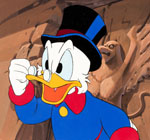 Additionally, while the Genie here is nowhere near the brilliance of Eric Goldberg’s animation and Robin Williams’ vocal performance in 1992’s Aladdin, the DuckTales version brings welcome comic relief to the film, thanks to fast-paced animation and Taylor’s trademark over-the-top performance (“Las Vegas must be some place if Cesar built his palace there!,” the Genie says while discovering the modern world).
Additionally, while the Genie here is nowhere near the brilliance of Eric Goldberg’s animation and Robin Williams’ vocal performance in 1992’s Aladdin, the DuckTales version brings welcome comic relief to the film, thanks to fast-paced animation and Taylor’s trademark over-the-top performance (“Las Vegas must be some place if Cesar built his palace there!,” the Genie says while discovering the modern world).
The Indiana Jones influence is also evident in many scenes and is ironic, as Barks’ comics were one of the influences for George Lucas when he created 1981’s Raiders of the Lost Ark.
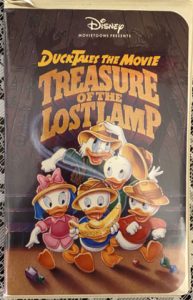 DuckTales The Movie also provided a starting point for new artists just beginning their animation and/or Disney animation careers, including brothers Paul and Gaëtan Brizzi, who would go on to co-direct “The Firebird Suite” segment of Fantasia 2000.
DuckTales The Movie also provided a starting point for new artists just beginning their animation and/or Disney animation careers, including brothers Paul and Gaëtan Brizzi, who would go on to co-direct “The Firebird Suite” segment of Fantasia 2000.
Opening on August 3, 1990, DuckTales the Movie received positive to mixed reviews from some critics, but many were not kind. Critic Charles Solomon’s Los Angeles Times review was entitled “Duck Tales Makes Mockery of Tradition,” and noted, “A cringing stereotype in the ‘a thousand pardons, sahib’ mold, Dijon will offend anyone of Middle Eastern descent who sees the film.”
DuckTales The Movie didn’t fare well at the box office (it was a far cry from The Little Mermaid’s blockbuster status the previous year).
As the animation renaissance hit the stratosphere through the 90s, Duck Tales the Movie: The Legend of the Lost Lamp, like many Disney movies, would gain new life and become a comforting “VHS friend” for many children.
Thirty-five years later, it’s that same generation that keeps Duck Tales the Movie: Treasure of the Lost Lamp close to their heart, and the show’s theme song running through their mind.